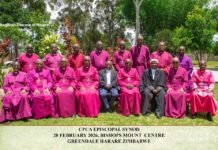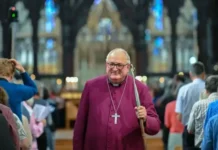The 24th meeting of Anglican Church of Kenya’s General Synod has adopted the first reading of amendments to its constitution governing the election of bishops and creation of new dioceses.
Meeting from 25-26 September 2019 at All Saints Cathedral in Nairobi, clergy and lay delegates from the 40 Kenyan dioceses along with members of the House of Bishops adopted proposals to reform the episcopal election process and to clarify language allowing and encouraging women priests to stand for election to the episcopate. The resolutions will now been sent to the dioceses for review. They will return to the next meeting of Synod in 2021 for action.
The text of the official resolutions have not yet been released by the provincial secretary, but participants in the meeting report the synod discussed how to prevent litigation over contested elections. In recent years a number of episcopal elections have been marred by charges of favoritism, with the outgoing bishop seeking to influence the voters to select his man. One proposal under consideration is to have the election of a new bishop not take place until at least 90 days after the previous bishop has left office.
A second proposal would raise the minimum age of episcopal election from 35 to 45 — permitting a maximum term of 20 years in office as bishops must retire on reaching the age of 65. The delegates believed it was not healthy for a diocese to freeze its leaders in place for up to 30 years, given the rapid growth of the church and the changing religious environment in Kenya.
Delegates to synod are also understood to have reaffirmed their support for women bishops, AI was told. The language of the current constitution states that any priest in good standing in the province aged 35 and older is eligible to stand for election. The consensus of synod was that the language of the constitution should explicity state that male or female clergy may stand for election — not relying upon grammar to imply that male pronouns in the language of the constitution include the female.
While the constitution and canons permit the election of female bishops in Kenya, the current Archbishop of Kenya, the Most Rev. Jackson Ole Sapit, has endorsed the GAFCON moratorium on electing new female bishops in the GAFCON provinces. South Sudan has a female assisting bishop, but the GAFCON archbishops have pledged to oppose the election of new women bishop at this time.
Other resolutions put forward discussed the criteria for forming new dioceses from existing dioceses, making clear the requirement that they be financiall viable and not merely constructed in response to tribal pressures.
Resolutions addressing deforestation, climate change and other local economic and social issues were adopted by the meeting, while the senior bishop in the province, the Rt. Rev. Charles Mwendwa, Bishop of Meru, was elected provincial dean.




Lord have mercy. I don’t want the members of GAFCON to continue innovating the Faith.
Join us in the Anglican Continuum.
We’re waiting on the Continuum to quit trekking in the wilderness. It’s going on 42 years now, no?
You’re aware of the recent concordat, right?
The condordat is a good first step. If it were followed by the retirement of the vast number of unnecessary bishops and actual union of the denominations, those would be good second and third steps. However, please do correct me if I am wrong, but my understanding is that it includes only 4 of the 50 odd “Continuing” denominations or jurisdictions. There was probably some consolidation earlier on as well that I am not aware of, but still.
In any case, the closest “continuing” parish is 100 miles from here, and there are many states, especially in the west, where there are no parishes at all, according to the map of the various “concordat” parishes provided by the ACA. And for that matter, none in the state of Illinois (ie- Chicago)- the one “pin” that appears to be in Illinois is listed as a parish in Wisconsin.
They probably don’t need to get rid of that many bishops, but they do need to be redeployed. How many Continuing bishops are there in South Carolina? Then add in ACNA and one begins to think a crozier shop might be a good business. The biggest hurdle will be preventing affinity dioceses from forming up along existing lines and effectively preventing actual mergers. ACNA will let you for one, and your bishop can live next door to a geographical bishop. I don’t think that was the intent, but that sometimes seems to be how it works, like Oprah handing out miters.
As for the 50 odd churches, well that is a problematic number, it could be bigger or smaller, but as there is no actual definition, let alone central authority to designate one as such, all a church has to do is declare themselves part of the continuum. You can use St. Louis as a starting point, but after years of splits and mergers and splits those lines get fuzzy. There are also older and newer groups that are substantially similar yet seem unlikely to come on board.
They probably don’t need to get rid of that many bishops, but they do need to be redeployed. How many Continuing bishops are there in South Carolina? Then add in ACNA and one begins to think a crozier shop might be a good business. The biggest hurdle will be preventing affinity dioceses from forming up along existing lines and effectively preventing actual mergers. ACNA will let you for one, and your bishop can live next door to a geographical bishop. I don’t think that was the intent, but that sometimes seems to be how it works, like Oprah handing out miters.
As for the 50 odd churches, well that is a problematic number, it could be bigger or smaller, but as there is no actual definition, let alone central authority to designate one as such, all a church has to do is declare themselves part of the continuum. You can use St. Louis as a starting point, but after years of splits and mergers and splits those lines get fuzzy. There are also older and newer groups that are substantially similar yet seem unlikely to come on board.
You should come down here to Central Florida. You can’t swing a cat without hitting an Archbishop from the Continuum with a cathedral in his garage. Ordinations start at $350.
$350 nowadays? Inflation has taken its toll over the years.
When I first heard the story of the multitude of Continuum bishops, the $100 ordination, and the in home cathedral, it was Wisconsin, and the year was about 1983. Numerous variations since.
In my own case, I would think twice about being a member of any church willing to ordain me.
Some private and public response to my comment above leads me to think I did a poor job getting my point across. What I meant was that the stories about some bishops in the Continuum have been going around for years, being embellished over time- without a lot of foundation.
Kind of like Groucho and the the country club?
Talk about coming out of the woodwork. The big push to get the Ordinariate snowball rolling was a real eye opener. The forum was saturated with entities hearing the call to cross the Tiber. Many were not even loosely associated with the Anglican world. Their websites had bishops dressed in the regalia and pictures of beautiful altars but noticeably a lack of parishioners and many did hail from Florida. None made it to the Ordinariate including most of the ACA. Oh well. Maybe we’re back to when two or three gather…
Concordat signed a couple years ago? Yes. Hoping you can consolidate before you dissipate. We had a local ACA plant that provided safe refuge to us for a number of years after TEC’s coming out party in 2003. And then, Abp. Falk and Hepworth along with their web boy from Orlando made ACA their private toy box and drowned crossing the river. We moved to ACNA but then the new guy from Arizona insisted we move to Christian Episcopal Church because he didn’t like ACNA from day one. And then, the newer guy made the bold move of acquiring a 100+ year old church on a hill with steep entrances not safe for old people because the Holy Spirit caused Google’s algorithm to place it on top of a list. The new purchase was done for the sake of the children. The children moved to North Carolina with their mother. For all of us, we need to quit doing stupid and that goes for ACNA too. Yes, I’ve been through the reoccurring hope dissipate cycle.
And give up the 1979 book of alternative theologies?
And give up the 1979 book of alternative theologies?
Is the new Revised Standard 1979 Prayerbook from ACNA an improvement (a droll comment)?
Most of the Continuum accepts the 1928 book of alternative theologies, it seems. Invocation and Epiclesis. Prayers for the dead. Completely foreign innovations.
It’s a pity that not everyone can come to Sydney Diocese where in many places you would have to travel a fair distance each week to find a liberal Anglican church. Being evangelical would help of course. The few “high” churches tend to be quite liberal despite all the (empty?) ceremony. That is not to say that all of the Sydney orthodox clergy have it all correct. They don’t!
One wonders, David, what the “high” churches in Sydney do that is so liberal. I mean, I assume the archbishop and his suffragans do their job, and therefore, churchmanship aside, they “drive out strange doctrine”- that is, a presbyter preaching heretical doctrines would be removed from ministry.
If orthodox doctrine is followed, what is so liberal as to be objectionable? If orthodox doctrine is not followed, why have the bishops been allowed to continue in office if they are not doing their job?
It’s OK, they only have a rule that allows it, they haven’t done it yet. Trust them. After all they were open about this rule right? Oh, this is the first you’re hearing of it? Good thing we have the African churches to hold onto orthodoxy.
It’s OK, they only have a rule that allows it, they haven’t done it yet. Trust them. After all they were open about this rule right? Oh, this is the first you’re hearing of it? Good thing we have the African churches to hold onto orthodoxy.
When I was growing up, they called this “crapping the bed.”
Where does Christ’s teaching have anything to do with this?
1 Timothy 2:12 English Standard Version (ESV)
12 I do not permit a woman to teach or to exercise authority over a man; rather, she is to remain quiet
I don’t envy any of them this discussion or debate. This may in fact be the biggest test for GAFCON, because it is the first real internal battleground. South Sudan was handled poorly by GAFCON.
I am disappointed by a few of the comments about the Continuum. (No, I am not in it . . . yet.) Just about every churchmanship has tiny fringe jurisdictions with small fish leading in a very small pond. And holy orders for sale sadly also crosses churchmanships. And that includes Baptists, Pentecostals, self-proclaimed Roman Catholics, you name it.
But the core of the Continuum has made excellent progress in recent years towards unity and, yes, quality control. They do not deserve a number of these comments.
Comments can be very edgy but also a great source of feedback. The bishops are there to protect the faith and they haven’t. Who is there to point out the reoccurring mistakes that are championed over and over? Us slobs have our window for a time. A good comment should read, “You should join us in the Continuum because of 1, 2, 3…nth reasons.” Some of us have been there (ACA) and done that with the rug of hope jerked out in a few minutes. ‘We’re going to Rome.’ No we’re not.